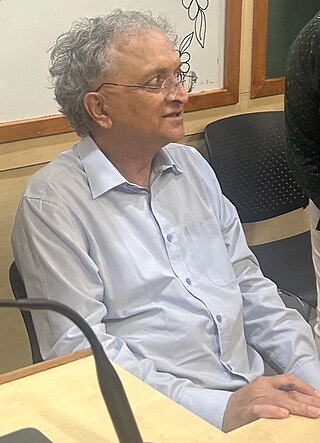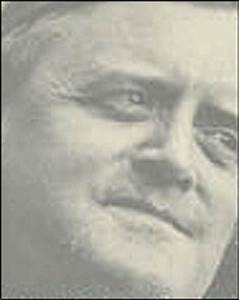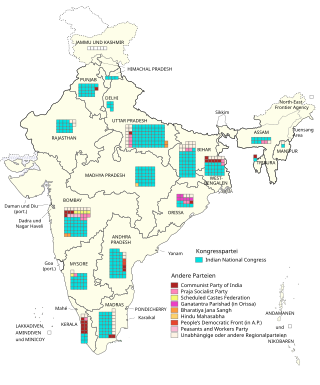
Chakravarti Rajagopalachari BR, popularly known as Rajaji or C.R., also known as Mootharignar Rajaji, was an Indian statesman, writer, lawyer, and Indian independence activist. Rajagopalachari was the last Governor-General of India, as when India became a republic in 1950 the office was abolished. He was also the only Indian-born Governor-General, as all previous holders of the post were British nationals. He also served as leader of the Indian National Congress, Premier of the Madras Presidency, Governor of West Bengal, Minister for Home Affairs of the Indian Union and Chief Minister of Madras state. Rajagopalachari founded the Swatantra Party and was one of the first recipients of India's highest civilian award, the Bharat Ratna. He vehemently opposed the use of nuclear weapons and was a proponent of world peace and disarmament. During his lifetime, he also acquired the nickname 'Mango of Salem'.

Mahadev Haribhai Desai was an Indian independence activist, scholar and writer best remembered as Mahatma Gandhi's personal secretary. He has variously been described as "Gandhi's Boswell, a Plato to Gandhi's Socrates, as well as an Ānanda to Gandhi's Buddha".

Sachchidananda Hirananda Vatsyayan, popularly known by his pen name Agyeya, was an Indian writer, poet, novelist, literary critic, journalist, translator and revolutionary in Hindi language. He pioneered modern trends in Hindi poetry, as well as in fiction, criticism and journalism. He is regarded as the pioneer of the Prayogavaad (experimentalism) movement in modern Hindi literature.

Ramdhari Singh, known by his pen name Dinkar, was an Indian Hindi language poet, essayist, freedom fighter, patriot and academic. He emerged as a poet of rebellion as a consequence of his nationalist poetry written in the days before Indian independence. His poetry exuded Veer Rasa, and he has been hailed as a Rashtrakavi and Yuga-Chāraṇa on account of his inspiring patriotic compositions. He was a regular poet of Hindi Kavi Sammelan and is hailed to be as popular and connected to poetry lovers for Hindi speakers as Pushkin for Russians.

Vishnu Prabhakar was a Hindi writer. He had several short stories, novels, plays and travelogues to his credit. Prabhakar's works have elements of patriotism, nationalism and messages of social upliftment. He was the First Sahitya Academy Award winner from Haryana.

Kota Shivaram Karanth, also abbreviated as K. Shivaram Karanth, was an Indian polymath, who was a novelist in Kannada language, playwright and an ecological conservationist. Ramachandra Guha called him the "Rabindranath Tagore of Modern India, who has been one of the finest novelists-activists since independence". He was the third writer to be decorated with the Jnanpith Award for Kannada, the highest literary honor conferred in India. His son Ullas is an ecological conservationist.

Nayantara Sahgal is an Indian writer who writes in English. She is a member of the Nehru–Gandhi family, the second of the three daughters born to Jawaharlal Nehru's sister, Vijaya Lakshmi Pandit.

Qurratulain Hyder was an Indian Urdu novelist and short story writer, academic, and journalist. One of the most outstanding and influential literary names in Urdu literature, she is best known for her magnum opus, Aag Ka Darya, a novel first published in Urdu in 1959, from Lahore, Pakistan, that stretches from the fourth century BC to post partition of India.

Govind Mishra is an Indian novelist, who has written more than 53 books. He was also a civil servant with Indian Revenue Service (IRS) and retired as Chairperson, Central Board of Direct Taxes in 1997. Over the years, he has written 11 novels, 14 short story collections, five travelogues, five literary essays collection, a poem collection and 2 story books for children.

Ramachandra "Ram" Guha is an Indian historian, environmentalist, writer and public intellectual whose research interests include social, political, contemporary, environmental and cricket history, and the field of economics. He is an important authority on the history of modern India.

Umashankar Jethalal Joshi was an Indian poet, scholar and writer known for his contributions to Gujarati literature. He wrote most of his works in Gujarati.

Harry Verrier Holman Elwin was a British-born Indian anthropologist, ethnologist and tribal activist. He first abandoned the clergy, to work with Mahatma Gandhi and the Indian National Congress, then converted to Hinduism in 1935 after staying in a Gandhian ashram, and split with the nationalists over what he felt was an overhasty process of transformation and assimilation for the tribals. Verrier Elwin is best known for his early work with the Baigas and Gonds of Orissa and Madhya Pradesh in central India, and he married a 13 year old member of one of the communities he studied. He later also worked on the tribals of several North East Indian states especially North-East Frontier Agency (NEFA) and settled in Shillong, the hill capital of Meghalaya.

General elections were held in India between 25 October 1951 and 21 February 1952, the first national elections after India attained independence in 1947. Voters elected the 489 members of the first Lok Sabha, the lower house of the Parliament of India. Elections to most of the state legislatures were held simultaneously.

General elections were held in India between 24 February and 14 March 1957, the second elections to the Lok Sabha after independence. Elections to many state legislatures were held simultaneously.

Sukumar Sen was an Indian civil servant who was the 1st Chief Election Commissioner of India, serving from 21 March 1950 to 19 December 1958. Under his leadership, the Election Commission successfully administered and oversaw independent India's first two general elections, in 1951–52 and in 1957. He also served as first Chief Election Commissioner in Sudan in 1953.

Dr. D. R. Nagaraj was an Indian cultural critic, political commentator and an expert on medieval and modern Kannada poetry and Dalit movement who wrote in Kannada and English languages. He won Sahitya Akademi Award for his work Sahitya Kathana. He started out as a Marxist critic but renounced the Marxist framework that he had used in the book Amruta mattu Garuda as too reductionist and became a much more eclectic and complex thinker. He is among the few Indian thinkers to shed new light on Dalit and Bahujan politics. He regarded the Gandhi-Ambedkar debate on the issue of caste system and untouchability as the most important contemporary debate whose outcome would determine the fate of India in the 21st century.
Des Raj Goyal (1929-2013), also known as Desraj Goyal or D. R. Goyal, was an Indian journalist, academic and a well-known author of books on secularism and communalism. Having been a member of the Hindu nationalist organisation Rashtriya Swayamsevak Sangh (RSS) in his younger days, he wrote a seminal book on the organisation in 1979, which is widely cited in academic works.

The Tribal World of Verrier Elwin is an autobiography of anthropologist Verrier Elwin published by Oxford University Press. The book was published posthumously in May 1964, three months after the death of Elwin. It was awarded the Sahitya Akademi Award in 1965.

Prithvi Singh Azad (1892–1989) was an Indian independence activist, socialist revolutionary and one of the founder members of Ghadar Party. He suffered incarceration several times during the pre-independence period, including a term in the Cellular Jail. The Government of India awarded him the third highest civilian honour of the Padma Bhushan, in 1977, for his contributions to society.

















